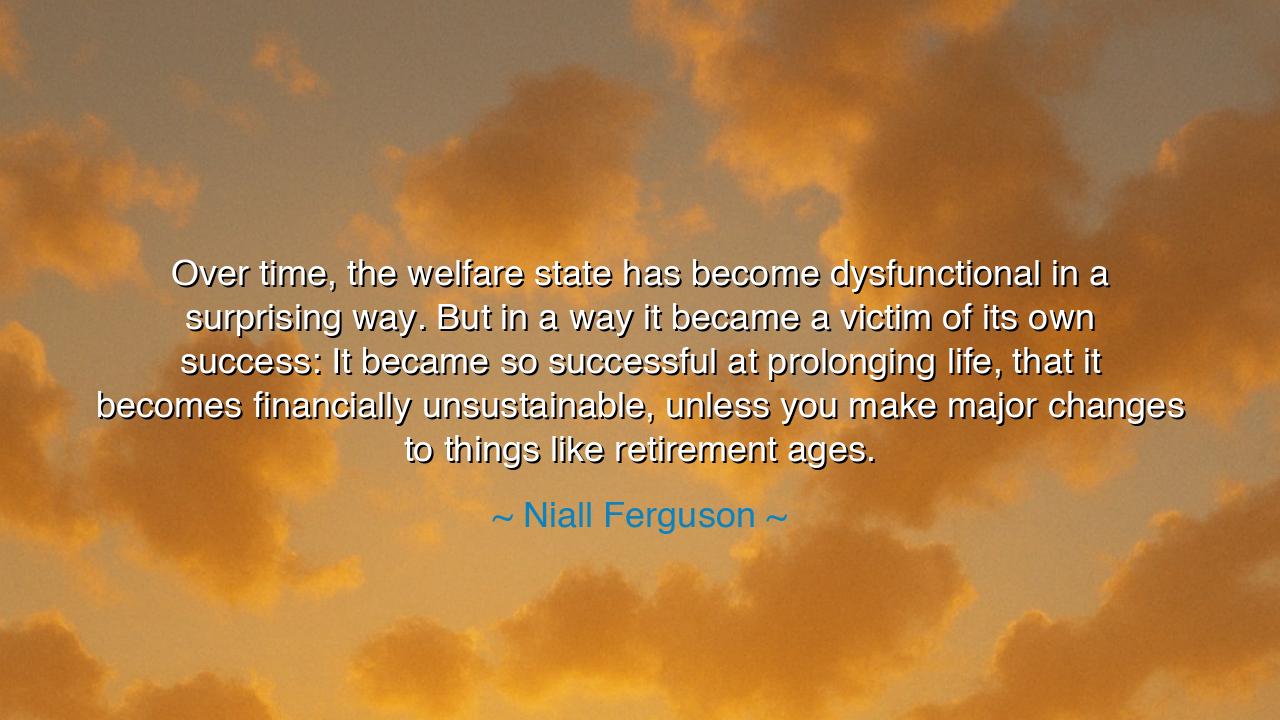
Over time, the welfare state has become dysfunctional in a
Over time, the welfare state has become dysfunctional in a surprising way. But in a way it became a victim of its own success: It became so successful at prolonging life, that it becomes financially unsustainable, unless you make major changes to things like retirement ages.






Hear the words of Niall Ferguson, who spoke with piercing clarity: “Over time, the welfare state has become dysfunctional in a surprising way. But in a way it became a victim of its own success: It became so successful at prolonging life, that it becomes financially unsustainable, unless you make major changes to things like retirement ages.” In these words lies a paradox as ancient as civilization itself—that even the noblest of human inventions can, by their very triumph, sow the seeds of their own undoing.
The ancients too understood this irony. The philosopher warned that every empire, at the height of its greatness, contained within itself the cause of its decline. What is true of nations is also true of institutions. The welfare state, created to shield the weak, to uplift the poor, and to preserve dignity in old age, has done its work so well that it lengthened the very lives it sought to protect. Yet in this triumph lies a burden: more years to sustain, more mouths to feed, more wealth demanded of systems already stretched thin. Thus, success becomes its own challenge, and preservation demands change.
Consider the tale of Rome. At its height, Rome promised bread and circuses to its citizens, a guarantee that the state would care for its people. For a time, it worked; the people were fed, entertained, and loyal. But as the empire grew, so too did the demands. Grain shipments strained the treasury, and the weight of sustaining so many without reform became crushing. Rome, mighty as it was, learned too late the lesson Ferguson now teaches: that even the strongest system must evolve, or it will collapse under its own achievements.
In Ferguson’s words is also a warning about time. For what begins as a blessing can, if left unchanged, harden into dysfunction. Retirement, once a relief for the aged few, has now become an extended season of decades for millions, stretching the capacity of states beyond their means. To cling to old rules while life itself has changed is folly. Just as men must adapt their tools when the earth yields new challenges, so must societies adjust their laws when the triumphs of medicine and longevity alter the balance of life.
Yet this is not a call to despair, but to wisdom. For if the problem lies in success, then the solution lies in adaptation. Humanity is not powerless before the weight of its own achievements. It must choose courage over complacency, reform over decay. To raise the retirement age, to rethink the ways in which care and work are balanced, is not cruelty, but necessity. It is the discipline of pruning a tree so that it may continue to grow, rather than letting it rot beneath the burden of untrimmed branches.
Let this teaching be carved into the minds of all who hear: do not rest upon the laurels of past victories. Do not think that what once worked will work forever. Life changes, times shift, and every triumph demands renewal. Whether in nations, in families, or in the hearts of individuals, to stand still is to wither. To grow, one must adapt. Sustainability is not found in holding fast to what was, but in reshaping it to meet what is.
Practical wisdom follows: in your own life, examine the systems you rely upon—your habits, your work, your relationships. Ask yourself: have they become victims of their own success? Do the practices that once gave strength now weigh you down? If so, reform them. Adjust your ways before the weight becomes too heavy. Just as nations must recalibrate their institutions, so must each person recalibrate their path.
Thus, remember Niall Ferguson’s words: the greatest dangers are often born from the greatest triumphs. Do not fear this truth, but embrace it. For in the courage to adapt lies the strength to endure. The welfare state must change, as all things must, and so too must we. Let us honor success not by clinging to it as it was, but by reshaping it for the future it has created. This is the way of wisdom, the way of survival, and the way of true progress.






AAdministratorAdministrator
Welcome, honored guests. Please leave a comment, we will respond soon